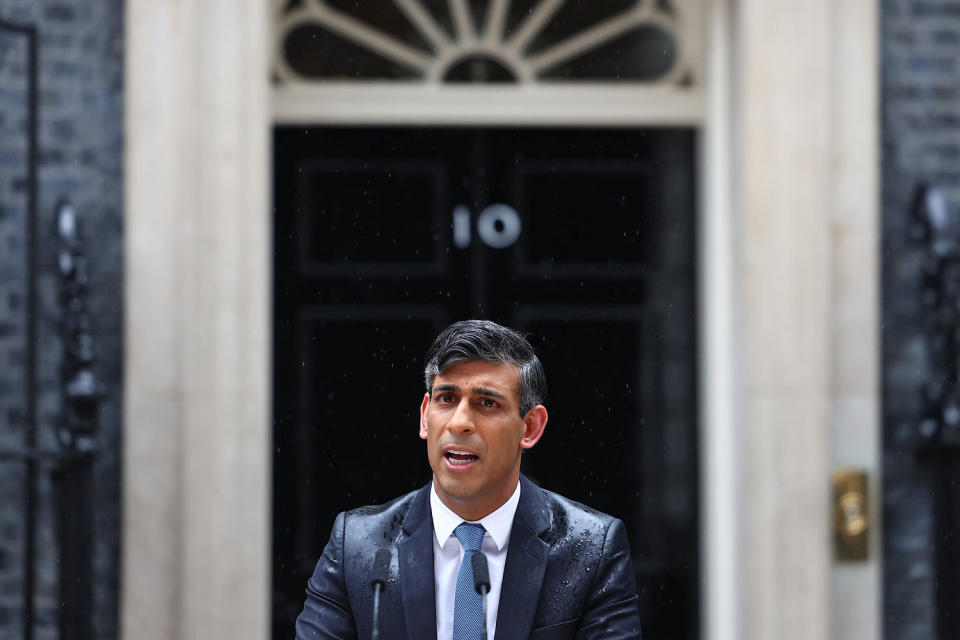British PM Rishi Sunak calls election, with his Conservatives at risk of a heavy defeat
- Oops!Something went wrong.Please try again later.
- Oops!Something went wrong.Please try again later.
LONDON — British Prime Minister Rishi Sunak has called a new election for July 4, setting his ruling Conservative Party the challenge of overturning dismal polling if it is to retain its 14-year hold on power against the high-flying opposition Labour Party.
Sunak made the announcement on a rainy Wednesday evening outside the prime minister’s official London residence, 10 Downing Street, while also highlighting what he called “hard-earned economic stability” that his government had achieved.
Sunak said that in the last five years the U.K. had fought through the most challenging times since World War II before he went on to refer to the Covid-19 pandemic and an energy crisis brought on by Russia’s war with Ukraine.
“Now is the moment for Britain to choose its future,” he said.
“I hope that my work since I became prime minister shows that we have a plan and are prepared to take bold action about what is needed even when that has been difficult,” he said.
Sunak met with King Charles III at Buckingham Palace earlier Wednesday afternoon — a meeting they have weekly — and a spokesperson said the royal family will postpone any engagements that might distract from the election campaign, as is customary, Sky News reported.
Electoral law in the U.K. means the vote had to be held sometime before Jan. 28 next year.
Though Sunak was legally bound to call the election, the timing came as something of a surprise, not least because victory will be a tall task.
His traditionally center-right Conservative Party has governed since 2010 and dominated postwar politics.
But the past three years have brought turmoil and scandal — from the norm-busting premiership of Boris Johnson to Liz Truss’ quixotic clash with global markets — coupled with public dismay over the stagnant economy, crumbling infrastructure and decrepit public services.
Labour leader Keir Starmer seized on those concerns in a flashy political attack posted on X as Sunak announced the election date.
At a news conference Wednesday evening, Starmer, 61, a former prosecutor, said a vote for his party would bring change and pledged to "return Britain to the service of working people."
"We will stop the chaos," he added.
Just five years ago, Johnson romped to victory on the back of Brexit, Britain’s vote to leave the European Union, which allowed him to win big in previously left-wing post-industrial heartlands. Most Britons now see Brexit as a failure, according to most polls, and its headwinds have been partly responsible for rending deep divisions within the Conservatives and beyond.
Things can change quickly in the U.K., as that shift illustrates, but most polls suggest that if the vote were held tomorrow, the Conservatives could be handed a historic wipeout and Labour a landslide win. Some senior Conservatives have said publicly that they don't think there's any point in prolonging the wait, with down-trending polls risking even bigger defeat for the party.
The general election, as it’s known here, will elect the 650 members of the House of Commons. Those members of Parliament, or MPs, are the primary lawmakers in the U.K.
However, unlike in the U.S., where the president and Congress are elected separately, Sunak and most of his government ministers are all MPs, too, and thus they are elected — or not — with everyone else on the big night.

Sunak, 44, has never been voted in as leader by the general public; rather, he was chosen internally by his own party as the successor to Truss, his historically short-lived predecessor. He is the country’s sixth Conservative leader since David Cameron was elected in 2010, and he has shifted the party rightward, focusing on immigration and “anti-woke” language, to the chagrin of his more centrist colleagues.
Starmer would become prime minister if Sunak is unable to produce what would be a dramatic turnaround.
Starmer took over the party after it suffered a crushing defeat under leftist Jeremy Corbyn in 2019. He has polled far better, but he is also accused by those on the left of selling out Labour’s principles and moving rightward to do so.
Other parties include the Scottish National Party, which dominates politics in Scotland but has recently been rocked by internecine strife. And the anti-immigration Reform UK party — founded by former President Donald Trump ally Nigel Farage — is pressuring the Conservatives from the right.
Meanwhile, the centrist Liberal Democrats and the environmentalist Greens will hope to improve their own more modest vote shares, possibly by capitalizing on the backlash against Labour over its stance on the Israel-Hamas war.
This article was originally published on NBCNews.com

